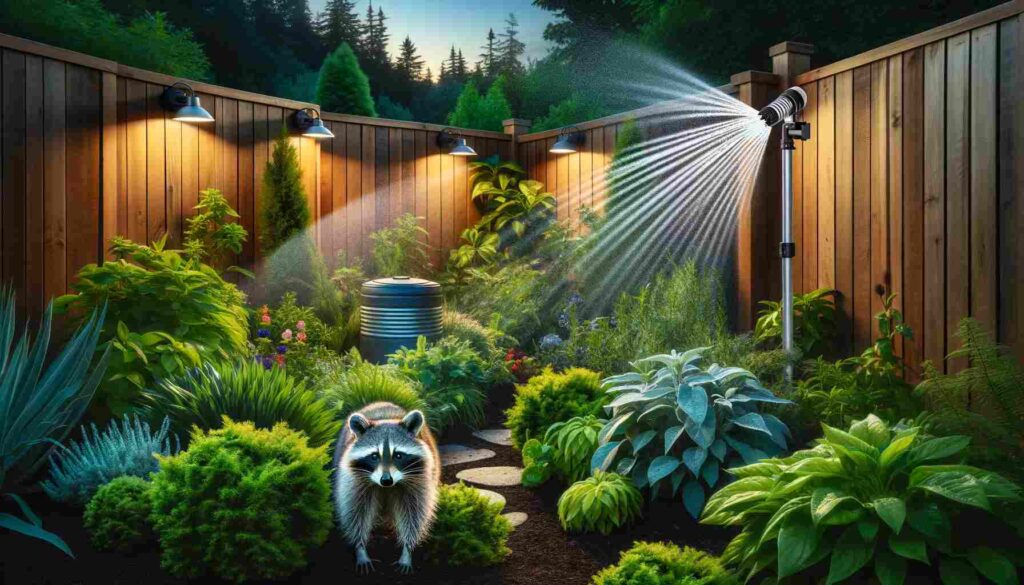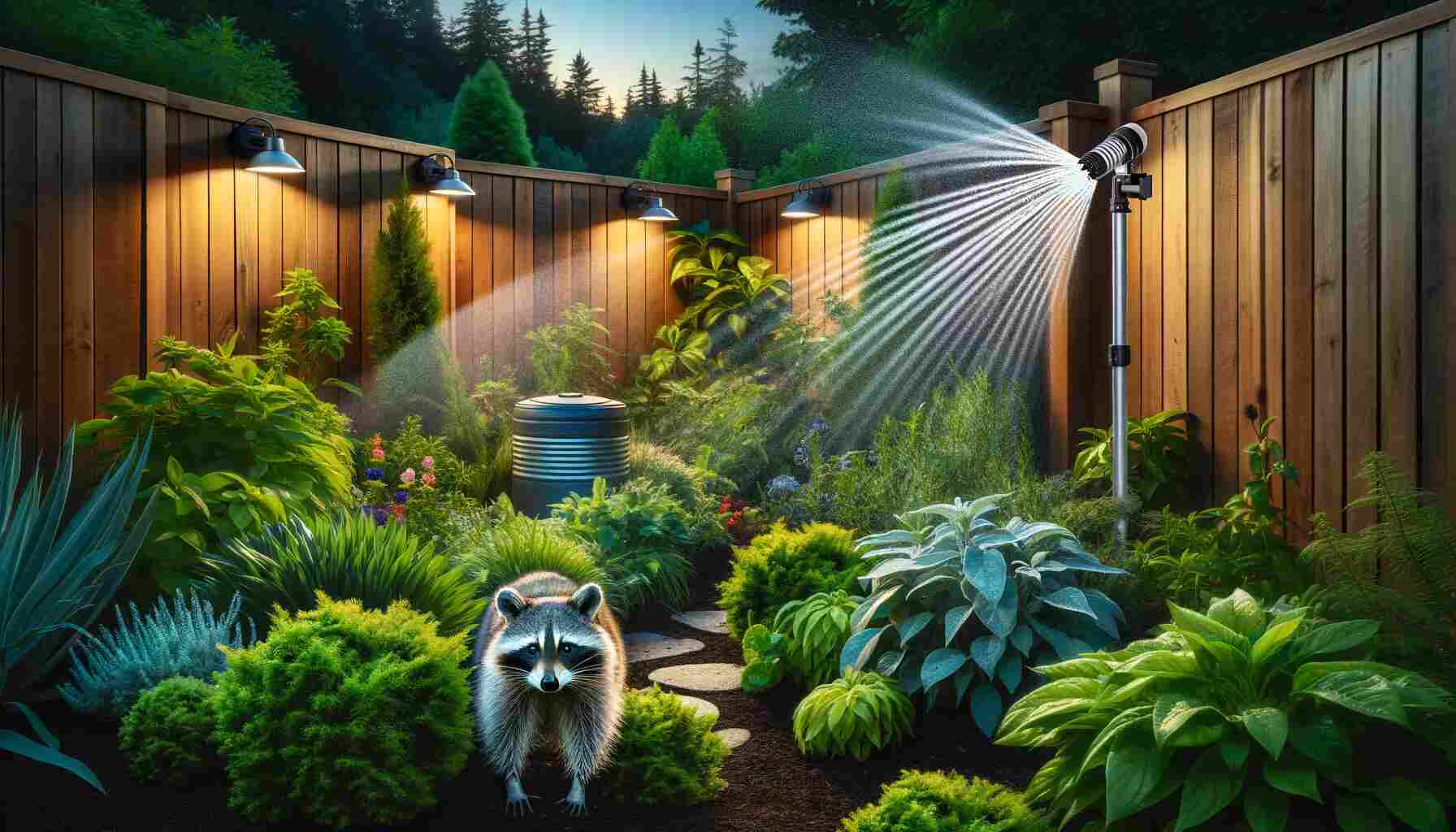
How To Deter A Raccoon From Raiding Your Grow Garden: Effective Strategies
Discovering a raccoon in your grow garden can be a frustrating experience for any gardener. These masked bandits are notorious for their opportunistic feeding habits, and a lush garden filled with ripe fruits and vegetables is an irresistible buffet. Knowing how to get a raccoon out and keep them out is crucial for protecting your hard work and ensuring a successful harvest. This article explores effective strategies to deter raccoons and safeguard your precious plants.
Understanding the Raccoon Threat
Before diving into deterrent methods, it’s important to understand why raccoons are attracted to gardens in the first place. Raccoons are omnivores with a highly adaptable diet. They are drawn to the easy access to food sources that gardens provide, including:
- Fruits (berries, tomatoes, melons)
- Vegetables (corn, squash, cucumbers)
- Nuts and seeds
- Insects and grubs found in the soil
- Pet food or garbage left outdoors
Raccoons are also intelligent and resourceful, quickly learning where to find food and how to access it. They are active primarily at night, making it difficult to catch them in the act. Therefore, proactive prevention is key to keeping them away.
Effective Deterrent Strategies
Physical Barriers
One of the most effective ways to deter raccoons is to create a physical barrier around your garden. This prevents them from accessing the plants and discourages them from even attempting to enter. Consider these options:
- Fencing: A sturdy fence at least 4 feet high, buried a few inches into the ground, can be a significant deterrent. Chicken wire or hardware cloth is a good choice, but ensure the mesh is small enough to prevent raccoons from squeezing through. Adding an electric fence wire along the top can further enhance its effectiveness.
- Netting: Covering individual plants or entire garden beds with netting can protect them from raccoons. Secure the netting tightly to prevent them from lifting it.
- Row Covers: These lightweight fabrics can be draped over plants to provide a physical barrier against raccoons and other pests.
Motion-Activated Devices
Motion-activated devices can startle raccoons and deter them from entering your garden. These devices use sensors to detect movement and trigger a response, such as:
- Sprinklers: A sudden burst of water can scare raccoons away without harming them. Place the sprinkler in an area where raccoons are likely to enter your garden.
- Lights: Bright, flashing lights can disorient raccoons and make them feel unsafe. Position the lights to cover the areas most vulnerable to raccoon intrusion.
- Sound Devices: Ultrasonic devices emit high-frequency sounds that are unpleasant to raccoons but inaudible to humans. While their effectiveness can vary, they may provide an additional layer of deterrence.
Repellents
Various repellents can be used to discourage raccoons from entering your garden. These repellents work by targeting their sense of smell or taste, making the area less appealing. Some popular options include:
- Commercial Repellents: Many commercial repellents are available in liquid or granular form. Look for products that contain ingredients like capsaicin (from chili peppers), garlic, or predator urine. Follow the instructions carefully and reapply as needed, especially after rain.
- Homemade Repellents: You can also create your own repellents using common household ingredients. For example, a mixture of cayenne pepper, water, and dish soap can be sprayed on plants to deter raccoons. Garlic powder sprinkled around the garden can also be effective.
- Ammonia: Raccoons dislike the smell of ammonia. Soak rags in ammonia and place them around your garden, or hang them in mesh bags. Replace the rags regularly as the ammonia evaporates.
Eliminating Food Sources
One of the most crucial steps in deterring raccoons is to eliminate any potential food sources in and around your garden. This includes:
- Securing Garbage Cans: Raccoons are notorious for raiding garbage cans. Use cans with tight-fitting lids and secure them with bungee cords or weights. Consider storing garbage cans in a shed or garage.
- Removing Pet Food: Do not leave pet food outdoors, especially overnight. If you feed your pets outside, clean up any leftover food immediately.
- Harvesting Regularly: Pick fruits and vegetables as soon as they are ripe to prevent raccoons from being attracted to your garden. Remove any fallen or rotting produce promptly.
- Cleaning Up Bird Feeders: Bird feeders can attract raccoons, especially if they are easily accessible. Use feeders that are designed to prevent spillage and clean up any spilled seeds regularly.
Habitat Modification
Raccoons are attracted to areas that provide shelter and nesting sites. By modifying your habitat, you can make it less appealing to them.
- Trim Trees and Shrubs: Raccoons often use trees and shrubs to access roofs and other elevated areas. Trim branches that overhang your garden or house.
- Seal Entry Points: Inspect your house and other structures for any potential entry points, such as holes in the foundation or gaps around pipes. Seal these openings to prevent raccoons from nesting inside.
- Remove Debris: Clear away piles of wood, rocks, or other debris that could provide shelter for raccoons.
Humane Trapping and Relocation (Use with Caution)
In some cases, trapping and relocating raccoons may seem like a viable solution. However, this should be considered a last resort and should be done with caution. Here’s why:
- Legality: Trapping and relocating raccoons may be illegal in your area. Check with your local wildlife agency before attempting to trap a raccoon.
- Stress: Trapping and relocating can be highly stressful for raccoons, especially if they are separated from their young.
- Ineffectiveness: Relocated raccoons often struggle to survive in unfamiliar territory, and other raccoons may quickly move into the vacated area.
If you do decide to trap a raccoon, use a humane trap and release it in a suitable location at least 10 miles away from your property. Wear gloves to avoid contact with the raccoon and its droppings. Consider hiring a professional wildlife removal service to handle the trapping and relocation process.
Community Involvement
Raccoon control is often most effective when it’s a community effort. Talk to your neighbors about raccoon problems and work together to implement deterrent strategies. This can help to reduce the overall raccoon population in your area and make your gardens less attractive to them.
Long-Term Prevention
Successfully deterring raccoons from your grow garden requires a combination of strategies and ongoing vigilance. Regularly inspect your garden for signs of raccoon activity, such as:
- Disturbed plants
- Missing fruits or vegetables
- Tracks or droppings
- Upturned garbage cans
Adjust your deterrent methods as needed and be prepared to adapt to changing conditions. By implementing a comprehensive approach, you can protect your garden from raccoon damage and enjoy a bountiful harvest. Knowing how to get a raccoon away and keep them away is a continuous process. Consistent effort in maintaining the deterrents is key to success.
Remember, how to get a raccoon out of your garden isn’t just about protecting your plants; it’s also about maintaining a healthy ecosystem. By using humane and ethical methods, you can coexist with wildlife while safeguarding your gardening efforts. Understanding how to get a raccoon to leave and stay away involves a combination of prevention, deterrents, and responsible practices. By following these guidelines, you can create a garden that is both productive and raccoon-free. If you are still struggling with how to get a raccoon away, consider consulting with local wildlife experts. They can provide tailored advice based on your specific situation and local regulations. The key to successful raccoon deterrence lies in understanding their behavior and implementing a proactive, consistent approach. Knowing how to get a raccoon out of your garden is a valuable skill for any gardener. With patience and persistence, you can protect your plants and enjoy the fruits (and vegetables) of your labor. Remember that how to get a raccoon to stop visiting your garden is a long-term commitment. Regularly assess your strategies and make adjustments as needed to maintain their effectiveness. By staying vigilant and proactive, you can keep raccoons at bay and enjoy a thriving garden. The question of how to get a raccoon to leave for good often depends on your dedication to implementing and maintaining these deterrents. The more consistent and comprehensive your approach, the less likely raccoons are to return. So, take the time to understand their habits, implement the appropriate deterrents, and enjoy the peace of mind that comes with knowing your garden is protected. Finally, remember to research how to get a raccoon to leave humanely, to respect nature and wildlife.
[See also: Protecting Your Garden From Pests]
[See also: Building a Raised Garden Bed]
[See also: Choosing the Right Soil for Your Garden]

